You are currently browsing the daily archive for March 5, 2009.
(By Archbishop John, the Pascha of Christ, 1956, Paris)
The doors of repentance are opening, Great Lent is beginning. Every year Great Lent is repeated, and each time it brings us great benefit if we spend it as we should. It is a preparation for the life to come and, more immediately, a preparation for the Bright Resurrection.
Just as a stairway is built into a tall building in order to enable one, by climbing the steps, to easily reach the top, so too, the various days in the year serve as steps for our spiritual ascent. This is especially true of the days of Great Lent and Holy Pascha.
By means of Great Lent we cleanse ourselves of the filth of sin, and at Holy Pascha we experience the blessedness of Christ’s Kingdom that is to come. In climbing a high mountain, one tries to eliminate all unnecessary weight. The less a person carries, the easier it is for him to climb and the higher he is able to climb. So, too, in order to ascend spiritually, it is necessary first of all to free oneself from the weight of sin. This weight is lifted from us through repentance, provided that we banish from ourselves all enmity and forgive each person whom we consider to be at fault before us. Once cleansed and forgiven by God, we then greet the Bright Resurrection of Christ.
And what a priceless gift of God we receive, at the culmination of our lenten struggle. We already hear about this in the first hymns of the daily lenten stichera: “Our food shall be the Lamb of God, on the holy and radiant night of His Awakening: the Victim offered for us, given in communion to the disciples on the evening of the Mystery.” (Aposticha sticheron, Sunday of the Last Judgment).
Communing of the Body and Blood of the Risen Christ, unto life eternal — this is the aim of the holy Quadragesima [Forty Days]. Not only on Pascha do we commune, but during Lent also. On Pascha those people should commune who have fasted, confessed and received the Holy Mysteries during Great Lent. Just before Pascha itself there is little opportunity for a proper and thorough confession; the priests are very busy and most of the time occupied with the Passion services. Rather one must prepare ahead of time.
Each time one receives the Mysteries of Christ, one is united with Christ Himself; each time it is a soul‑saving act. Why, then, is such significance attached to receiving Holy Communion on the night of Holy Pascha, and why are we all called to do so?
Then, especially, we are given to experience the Kingdom of Christ. Then, especially, we are illumined with the Eternal Light and strengthened for the spiritual ascent.
This is an irreplaceable gift of Christ, an incomparable good. Let no one deprive himself of this joy and, instead of receiving Holy Communion on Pascha night, hasten to eat meat and other foods. Communing of the Holy Mysteries on that night prepares us for the banquet in the eternal Kingdom of God.
(Translated into English by G. Spruksts from the Russian text appearing in “Pravoslavnaya Rus‘” (“Orthodox Rus’”), No. 7, 1996, p.5. English-language translations copyright (c) 1998 by The St. Stefan Of Perm’ Guild; The Russian Cultural Heritage Society). Retrieved from The Holy Protection Russian Orthodox Church web site, 2049 Argyle Ave. LA, CA).Day 4: Epistle of Polycarp to the Philippians
Day 5: St. Ignatius of Antioch: Letter to the Ephesians
(By Father George Calciu)
My will for you is to never cease praying. My hope of you is to understand that, if there is a protection extending over human society, over our country, this is the power of prayer. Do not execute a prayer of routine, but put your heart in motion, fill yourself with the shiver of prayer. I am convinced that many of you are praying; I too was praying, and believed – before they placed me in prison (see note) – that I knew how to pray. There, (in gulag), I discovered that I do not know how to pray. (…). If the shiver of faith does not penetrate you from the head to the soles of your feet, you are not in true prayer. It is not easy. But if you persist, the Lord will help you and grant you the grace of prayer. And this grace is only given as you ask it. The grace of prayer is gained through great effort and persistence. Our Savior had said: “From John the Baptist on, the Kingdom of Heaven is taken by force (conquest)!” And this is “our conquest” – to ask with persistence for the grace that only the Lord can grant.
Now, Iwould like to address a word to the theologians and advise them: learn how to pray, so then you may teach others! As long as you do not know how to pray, it is in vain to say to your spiritual children “Pray!” When the priest will know how to pray, he will transmit this flow of power to his spiritual child.
(Fragments from a speech given in Bucharest, 1998, to ASCOR – Association of Christian Orthodox College Students of Romania and translated from Romanian by EC)
Note: Fr. George Calciu reposed in 2006 at the age of 81, having spent unjustly more than a quarter of his life in the diabolic prisons of Communist Romania, only because he confessed the Christian faith. From these experiences in prison, he emerged as a witness to God’s love, forgiveness, and ability to resurrect man from the death of his soul.




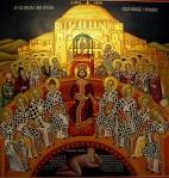 Christian Dogma
Christian Dogma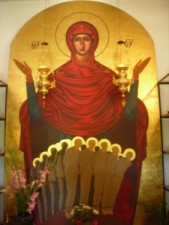 Christian Martyrs
Christian Martyrs Christian Orthodox Churches and Monasteries
Christian Orthodox Churches and Monasteries Christian Sermons and News
Christian Sermons and News Church's Teachings on Fasting
Church's Teachings on Fasting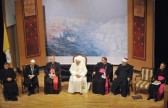 Ecumenism – a Great Heresy
Ecumenism – a Great Heresy Father George Calciu
Father George Calciu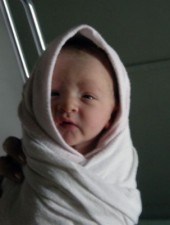 Life_a Sacred Gift form God
Life_a Sacred Gift form God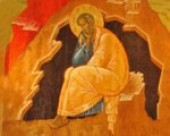 Orthodox Saints and Church Fathers
Orthodox Saints and Church Fathers Spiritual Elders
Spiritual Elders Daily Bible Readings
Daily Bible Readings Journey to Orthodoxy
Journey to Orthodoxy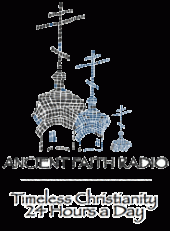 Listen to Ancient Faith Radio
Listen to Ancient Faith Radio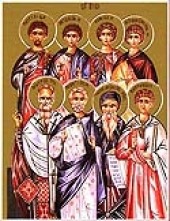 Orthodox Calendar of Feasts and Saints
Orthodox Calendar of Feasts and Saints Orthodox Christian Mission Center
Orthodox Christian Mission Center Orthodox Institute
Orthodox Institute OrthodoxChristianNetwork TV
OrthodoxChristianNetwork TV
Recent Comments